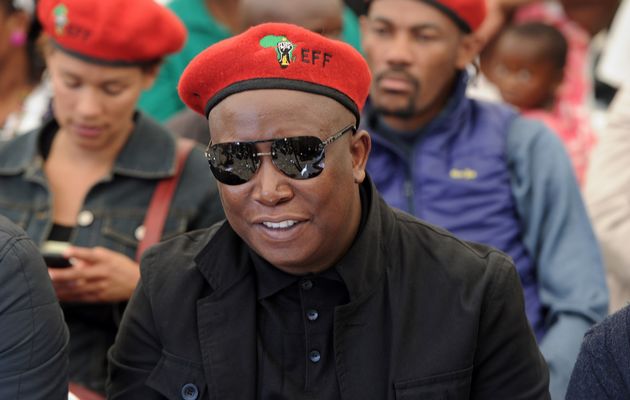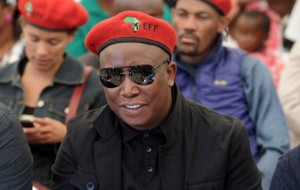This Is How The EFF Bank Account Looks Like…..

Last week saw four suspended Economic Freedom Fighters (EFF) MPs – Andile Mngxitama, Mpho Ramakatsa, Khanyisile Litchfield-Tshabalala and Lucky Twala – making sensational claims of financial mismanagement in the party.
Like all political parties in Parliament, the EFF receives substantial funding from the state, including a R15.7 million constituency allowance from Parliament and R9.8 million from the Independent Electoral Commission (IEC).
According to the four MPs, the EFF’s finances are being misused while the leadership – particularly leader Julius Malema and his deputy Floyd Shivambu – “live like members of drug cartels”.
City Press was given copies of bank statements of 18 of the party’s accounts dating bank to June last year. Some of the entries appear to support the claims of the EFF rebels, but others do not.
This week, Litchfield-Tshabalala said “it will take Jesus Christ helping those books” for the EFF to obtain a clean audit at the end of March, when Parliament and the IEC will ask the party to explain its spending.
On Friday, Malema rubbished their claims, saying they were fighting a political battle.
“Why would we want to compromise ourselves by tampering with the monies? We’ve got sound financial systems,” he said.
But this week, Mngxitama said there had been long-standing concerns about the party’s finances.
“We talk about it in the corridors, but never raise it,” he said.
“If you raise the issue of finances, it’s like you’re the enemy … This culture is based on the fear that any question is tantamount to disloyalty to the leader, and therefore threatening the unity of the party.”
Two other party members, who asked not to be named, agreed with Mngxitama, and others said there was simply no information forthcoming from the party about its finances.
“Whenever you start raising questions, you will be labelled: ‘You are an ANC agent, you are a rebel, you don’t want to be led,’” said one member. “You say ‘we want transparency and accountability’. But if you say the ANC government must account, it must start at home.”
CLAIM 1
Money from Parliament is being misused
One of the key issues raised this week was how Economic Freedom Fighters (EFF) constituency money is being spent. City Press found that about 108 full-time field workers in constituency offices were, in effect, working for free.
“We’ve always been told ‘the party has no money’ – that’s the song that’s been sung,” said Khanyisile Litchfield-Tshabalala. “You know through the grapevine that there’s constituency money, but you’ve never been told how much; you’ve never been briefed; you’ve never been informed on how to apply for it.”
The EFF received R15.7 million from Parliament as a constituency allowance. This money is supposed to be spent to run constituency offices and ensure the public has access to MPs. Parties that don’t spend this money in accordance with Parliament’s policy can be held liable and forced to repay their irregular expenditure.
The EFF runs its constituency offices from 54 regional offices. Apart from an administrator, each constituency office has two field workers who are each paid a R5 000 stipend from the constituency allowance. These field workers are not paid salaries and are expected to fund all their costs.
“They get no transport allowance; no cellphone allowance. How can you fund that with R5 000?” asked a regional EFF employee who did not want to be named.
“Before the elections, we could understand there was no money. But now, if we need to do work on the ground, we pay for it ourselves,” said another.
“They don’t get a salary; they get a stipend. [As a field worker] I have to use it for petrol, transport, phones – this is one of the things people are complaining about. It’s a full-time job – nine to five, five days a week.”
Julius Malema admitted this: “It’s not a salary; it’s voluntary work and they are paid an allowance of R5 000. You get an allowance of R5 000, which is mainly for transport purposes, because you are voluntary. And then each constituency has a cellphone, which is paid for by the head office.”
However, an internal party document lists the volunteers as “staff members”.
Andile Mngxitama said paying R5 000 to full-time workers was a “scandal”.
“Those of us in Parliament earn up to R1 million a year and then we ask somebody who works on the ground, those who keep the party alive, to work for nothing,” he said. “This is the culture of accepting inequality of treatment within the party.”
Regional and branch members City Press spoke to this week said they were told that, from next month, half of their field workers would be axed.
“We are waiting to see if they’re going to be paid on the 25th,” said a regional employee. “There was no letter given to terminate their contracts. They just told us there is no money.”
Malema confirmed this. “All the regions’ field workers are going to be reduced to one. We want to employ them and increase their monthly salary. We realised having two of them duplicates what they are doing. There is a firm proposal on the table, but it’s not yet a final decision.”
Other uses for constituency money
The EFF bank statements also show the constituency allowance appears to have been used for many other purposes, including paying head office expenses, the EFF accountant’s salary, R350 000 on T-shirts for its first anniversary party, and loans to other EFF bank accounts for its National People’s Assembly elective conference.
In addition, the EFF’s regional constituency allowance appears to have been used to pay legal fees (R50 000), T-shirts for volunteers (R72 500), and R70 000 that was given to rebel MP Mpho Ramakatsa for catering before the first anniversary party.
Malema denied any impropriety and was confident the EFF would pass its audit with flying colours.
“There’s no one who can sit back and tell us how we must use our money. If the constituency took a decision to drive the constituency through the first anniversary, whose business is that?” he asked.
“I would have a problem if you said to me people are taking constituency money for lavish lifestyles of politicians. That was not Julius Malema’s birthday party; that was the anniversary of the EFF.”
CLAIM 2
Mr 10%
The rebel EFF members claim that while all MPs donate 10% of their salaries to the party, Malema and Floyd Shivambu do not do this.
“This shows a pattern of entitlement to party resources,” said Litchfield-Tshabalala, who showed City Press her parliamentary payslip displaying a R6 468.46 contribution.
Malema sent City Press a photograph of his payslip, which showed he was also contributing 10% of his salary.
He asked us not to disclose its contents.
“I just want to demonstrate to you that you are dealing with dishonest people,” he said.
CLAIM 3
Malema’s R30 000 allowance
Rival politician Gayton McKenzie from the Patriotic Alliance published an open letter to Malema last week in which he accused him of receiving R30 000 a month on top of his parliamentary salary.
Malema earns R1 115 314 a year, or R92 942 a month before deductions.
City Press found one payment in August for R30 000 with the reference “Cicmonthlyallowance”. Malema is often referred to as the CIC (Commander in Chief).
Malema did not deny receiving the payment, but denied it was made monthly.
“For sure, I would have received it, but that is the allowance for travel and accommodation,” he said. “It’s an allowance based on whether I’m going out or I’ve been out; at times it’s even refunds.”
The money was paid from the general donations account of the EFF, which collects the R10 membership fees that fighters pay to join the party.
Ramakatsa’s legal bills
Some of the party’s money is being spent on legal fees for a 2012 case before the EFF was formed.
Documents include an R888 000 invoice from a Bloemfontein attorney for Ramakatsa’s case to have the ANC Free State elective conference of Premier Ace Magashule overturned.
Ramakatsa and five other ANC members then decided to take their case to the Constitutional Court.
They won, but the court decided not to award costs.
Ramakatsa left the ANC and was saddled with the bill.
The bill was sent to the EFF, which has paid R100 000 of it.
Malema said: “We took a political decision to assist him because they wanted to take his property for a political action he had taken in the Free State.
“It was not from Parly money; it was from the EFF main account.”
Ramakatsa said: “Those efforts also contributed towards the formation of the EFF … It is a bill incurred during the struggle, because if those struggles were not carried out, the EFF would not be here.”
Mngxitama said he was not aware of that deal.
“On the face of it, it should not happen,” he said.
CLAIM 4
Abuse of EFF credit cards
Rebel EFF members claim Malema has used the party’s credit card for personal expenses to live the high life.
They say that his “gluttony is astounding”.
In an open letter to Mngxitama last week, EFF accountant Rirhandzu Baloyi said the card was only “used for organisational purposes”.
Payments on the credit card include a night out at Cubaña in Polokwane (R2 600), shopping at Pick n Pay near Sandton (R10 502), two dinners at a Cape Town restaurant, Marco’s African Place (totalling R4 100), and hotel bills in Maputo, Mozambique, (totalling R5 445.64)
Malema denies using any EFF cards for personal expenses.
“It’s an organisational credit card and our accountant has clarified it.”
CLAIM 5
Malema defies EFF-sanctioned Woolworths boycott
The rebel EFF says while Malema called for a Woolworths boycott, he still shopped at the high-end grocery store.
There was one payment for R183.73, which was made at Woolworths on the EFF’s credit card.
Malema pointed us to Baloyi’s earlier statement that the credit card was used for “organisational purposes”.
But he refused to comment any further.





